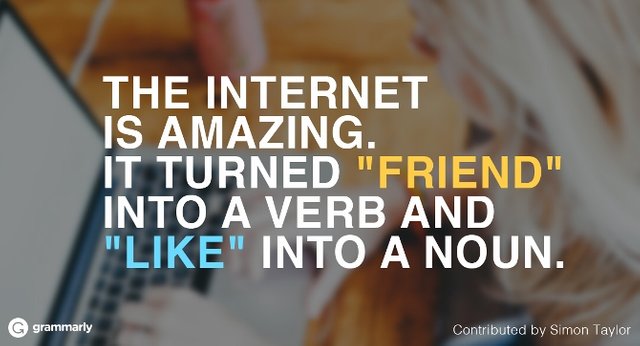Let's Google This! Boon and Bane of Brands Becoming Verbs In Business
We don't search information. We google it. However we don't bing it (at least not yet).
The big questions is: why are some popular brands or products used as verbs in our everyday conversations but others are not?
We facetime and skype, but we rather don't instagram or facebook.
Do we steemit? It sounds weird.
What does a brand need to become a verb? Is 'verbifying' actually beneficial?

Shakespeare also did it!
It's really mysterious.
We photoshop (edit images) but we don't word (edit text), even though these two are theoretically part of the very same game.
Technically, etymologists call this process 'anthimeria'.
Anthimeria is a rhetorical term for the creation of a neologism by using one part of speech (or word class) in place of another.
Most often we are talking about the usage of a noun as a verb.
Example: Don't forget to hashtag your post.
It's not a new phenomenon.
Shakespeare was a great verber, for instance.

However, there is a difference between art and marketing - and today's networks are extremely powerful. They can hype or destroy a brand withing very short time!
Verbifying can be creative and clever but in the business world it is abused and can become buzzword-speak.
If consumers understand the trademark to be the name of the product itself, as opposed to identifying its exclusive source, that trademark can lose its distinctiveness within the corresponding market.
There's a thin line for brands between positively increasing their degree of attention and negatively suffer from what is called 'genericide'.
Think of Hoover, Jacuzzi and Frisbee. When was the last time you took a dip in a whirlpool bath, played in the park with your flying disc or vacuum-cleanered your living room? Ha!
From one point of view, the marketers tend to believe that it is the ultimate compliment when a brand enters our everyday conversations and that it proves a strong and personal connection between consumers and brands.
The other side of the coin is that using a product or brand name this way risks losing the legal power of a trademark.

Allan Poulter (Partner at the international law firm Bird and Bird):
"It can be a big problem, because the brand stops being a badge of origin and just becomes a generic term. The brand is often the most valuable asset of a company - its exclusivity is what puts it apart.
If you get to the stage where you no longer have that, the brand is finished."
(Source: http://www.bbc.com/news/business-27026704)
Verbifying is definitely an increasing trend on the internet. Google and Twitter are trying to work against it.
Google is conscious of this problem. They even published rules for proper usage of all its trademarks, partly to help stem the use of google as a verb.
Twitter reacted as well in their IPO filing: "There is a risk that the word tweet could become so commonly used that it becomes synonymous with any short comment posted publicly on the internet, and if this happens, we could lose protection of this trademark."
Or just think about the Xerox ad campaign (2003): "When you use Xerox the way you use aspirin, we get a headache. There's a new way to look at it."

It seems that businesses rather try to avoid that their brands are introduced into our everyday language. Verbification is risky.
While marketers bring out the personal bond between brand and consumer, the intellectual property attorneys contend that verbifying a product or brand risks what is termed genericide.
It's a fine line.
In this spirit it might be an advantage that we blog but we don't steemit :)
I hope you found this somehow interesting.
Wishing you a magic Monday,
Marly -
Title image: coub.com; girls and logos: pinterest.com; verbification: grammarly.com
Hi @surfermarly, I don't steemit, but I steem. I am a South African and when somebody asks me what I am doing while steeming, I tell them I "stoom" which is Afrikaans for steem.
You are completely right! I've also used terms like "I'm steeming" or "I wish you a steemy weekend." in the past (thanks for refreshing my memory) :D Then it's similar to Twitter where we are "tweeting".
That an Afrikaans version for steem exists, is incredibly cool! Thanks for sharing it with us :)
Hi surfermarly, we don't have an Afrikaans version, we use the same version, it is just the word "stoom" which actually translate to "steam" , I am so used to "Steem", I spelled it wrong in my original comment.
https://sites.google.com/site/reviewandbonusinmysite/instant-swipe-file-amplified-review
Welcome to steemit @batata. If you have interesting information about a product, you are invited to share it with the community by publishing corresponding blog posts (as I can see you already did so). However, link dropping in threads of other users is not part of the game. Flagged for spamming.
I'm sorry for bothering you
No problem at all! :) I just wanted to explain the rules. You better don't drop links like that in threads of other people. Try to be smart and communicate your product recommendations through blog posts. Steem on!
great post as always @surfermarly - one thing - I know some people incl. myself who use the term facebooking - i am strange though
Oh really? No you are not strange, just weird :D Haha! Kidding.
Thanks for your support!
haha true 😎
ich las mal nur ein Vote da..... zum Lesen fehlt mir der Elan..... mach ich morgen... schönen Montag noch 🌸🌅👍
Dankeschön! Den wünsche ich Dir auch :-) Hoffe es gab kein Kopfweh vom Gin!?
vielen Dank......nein alles Gut.....
Interesting stuff to think about @surfermarly. I feel our language and interaction is changing because of the communication mediums; videos, social networks etc. These big companies are so big and overbearing on everybody's lives, that it just happens.